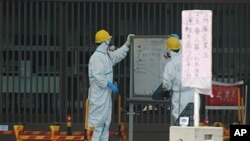Japan is breathing a slight sigh of relief after official word the crippled reactors at the Fukushima-1 nuclear power plant are now in a "cold shutdown" state. That means the water used to cool the damaged nuclear fuel rods is remaining below the boiling point, preventing the highly radioactive fuel from re-heating. But with a massive radioactive cleanup job unfinished - and possibly lasting decades - few have much reason to celebrate as 2011 comes to an end.
The March 11 earthquake and tsunami killed 20,000 people in northeastern Japan. Not only did the disaster trigger the meltdown of three reactors at the coastal Fukushima-1 nuclear power plant, it also reignited debate about the risks of atomic energy.
Although no one died of radiation exposure from the Fukushima accident, communities were evacuated. Even those hundreds of kilometers away from the nuclear plant are worried about long-term effects of the higher than normal radiation levels, especially on the health of children.
That anxiety is compounded by the detection of radiation levels above the legal limit in Japanese crops, fish and even milk.
Public confidence has been shaken since the first days of the crisis when the Fukushima plant operator and the government appeared to understate the severity of the disaster.
Roger Cashmore is chairman of Britain's Atomic Energy Authority. The nuclear physicist says the slow flow of information from Tokyo and the apparent withholding of important data during the height of the crisis undermined trust.
"Transparency is the word. One has got to be completely open about all of this and make sure that shortcuts and things like this can't be taken," said Cashmore. "People, I think, in retrospect have become very concerned about the regulatory system that existed in Japan."
The concern has led to scrutiny of what is dubbed the Japanese "nuclear village" - a cozy community of industry and government regulators as well as a complacent domestic media and powerful politicians.
Former U.N. Undersecretary Secretary General for Disarmament Affairs, Nobuyasu Abe (a director at the Japan Institute of International Affairs), says nuclear industry supporters have hampered oversight.
"In Japan, a great number of Japanese politicians receive political contributions from power companies," said Abe. "They may be influenced or they may be hesitant to be critical."
A former foreign minister and environment minister of Japan is criticizing the official response to the crisis over the past nine months. But Yoriko Kawaguchi, of the opposition conservatives, says the government must not let Tokyo Electric Power Company, known as TEPCO, go under at a time of crisis.
"There is no question, ultimately, that we will survive. We will manage the situation," Kawaguchi said. "TEPCO is almost bankrupt and the government is helping, financial institutions are helping. We have no other choice but to let TEPCO survive and do the work, no matter how long it's going to take."
About 80 percent of Japan's nuclear reactors are now offline, mainly for safety inspections.
That, along with increasing generation costs and a slowing demand for electricity (with China being the notable exception), has led to nuclear power production globally falling this year, according to the Worldwatch Institute.
But Kawaguchi says Japan, an island nation with scant natural resources, cannot follow Germany, which has decided to shut down all of its nuclear power plants.
"Without nuclear power generation, it will be difficult for us to keep our economy growing, probably for some years - 10, 20, 30 years to come. Japan is isolated," Kawaguchi said. "We are not like Germany where you can import energy from France where electricity is produced using nuclear power."
To maintain economic growth, she says the Japanese government must restore public confidence, which vaporized after the reactor meltdowns. That could turn out to be a task that takes decades to accomplish.





